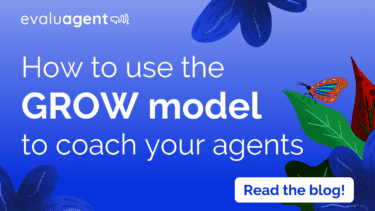How to use the GROW model to coach your agents


Let’s set the scene, you’ve just had some customer feedback relating to an agent that didn’t seem to care about the customer’s situation. Frustrating, right? You know that empathy is a key skill in customer service that allows agents to put themselves in the customers shoes to understand their issue and find the best possible outcome. But, when agents don’t have this skill, it can lower your CSAT scores and give your business a bad reputation.
So, how would you teach this much needed skill of empathy to the agent? Let’s look at how you can implement the GROW model in the subsequent coaching conversation with the agent!
The GROW model provides a basic structure for coaching that uses lots of open questions. This allows the agent to take ownership of their development whilst arriving at their own conclusions without you needing to tell the agent what they should or shouldn’t do.

When using GROW, you begin with the end goal in mind. In this case you want the agent to be able to appropriately empathise with the customer. The goal might not be as clear to the agent, so it’s important to ask the right questions. “What happened that led the customer to feel this way”and “How could this have been turned around?” are both questions that can help an agent arrive at a goal. It’s important that when setting the goal you choose a SMART goal, which means Specific, Measurable, Achievable, Realistic and Time-Bound.

It’s important to understand the current reality that the agent finds themselves in at this moment in time. Questions such as “How do you feel when a customer expresses frustration or upset?”, “What is getting in the way of showing empathy towards the customer?”and “How important is it that the customer knows you care?”can help you understand the reality. When setting goals, it’s essential to pinpoint where you are now and the direction you need to head in to achieve the goal.

Now that we understand the goal and have explored the current situation, we can discuss the possible options available to help them show empathy to customers at the appropriate time. Spend time analysing and mind mapping ways and methods that will help them to achieve their goal. Offer advice and suggestions but ensure that it’s the agent coming up with ideas. Ask questions such as “What could you do to show empathy?”, “What ideas do you have?”, “Who could help you with this?”, and of course as the number one question in your coaching toolkit “What else?”. However, don’t feel like you need to be rigid with your questions – creativity is key!

You’ve set the goal, examined where the agent is currently and discussed the options they have to achieve the goal. Now is the time to work out a way forward. This is where the agent commits themselves to perform actions on a consistent and regular basis that will lead them to achieving the goal. Ask questions such as “How committed are you to achieving your goal?”, “What will you do?” and “When will you do it?” to understand the steps that need to be taken.

At the end of the coaching session, with the help of the GROW model, your agent will have understood that by not acknowledging the customer’s situation or feelings it has come across that they don’t care.
The Goal is conveying that they care by empathising. The Reality is that they do care and focus on solving the problem but can sometimes come across as too process focused. They then came up with some Options to listen to other agent’s calls to see the positive impact empathy has on conversations. Our “What else?” question gave them time to think about how they can use other agents calls to create a toolkit of statements to use that show empathy. Finally, the Way Forward is to arrange a time to listen to other agents calls and they’ve committed to have completed the tool kit by the end of the month.
Once you’ve used the GROW model it will soon become a staple of your coaching strategy. More knowledgeable agents lead to a better customer experience. EvaluAgent LMS makes training new and existing sales and customer service agents easier than ever before. Click here to find out more.
